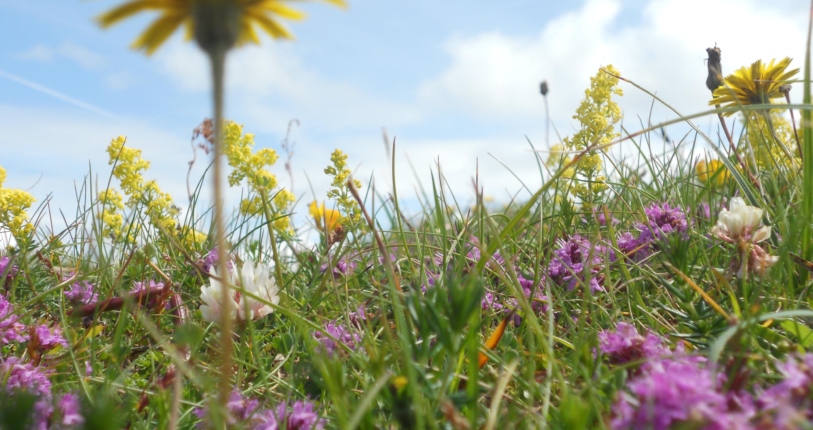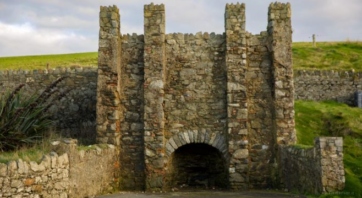
Climate and Heritage
Climate change is already having significant impacts on Ireland's heritage, threatening natural and built environments as well as tangible and intangible cultural heritage.

The Farming for Nature Technical Group was convened by the Heritage Council as part of its ongoing High Nature Value (HNV) Farming Ireland work to feed into the development of Ireland’s Common Agricultural Policy Strategic Plan 2023-2027.
The Farming for Nature Technical Group was convened by the Heritage Council as part of its ongoing High Nature Value (HNV) Farming Ireland work to feed into the development of Ireland’s Common Agricultural Policy Strategic Plan 2023-2027.
The Heritage Council has long advocated for the support of High Nature Value (HNV) farming systems in Ireland. In response to declared national crises in both climate change and biodiversity in 2019, the Heritage Council sought a focused response, setting out how Ireland might best apply these principles in the context the European Green Deal and of expected changes to the EU Common Agricultural Policy (CAP).
The Farming for Nature Technical Group was convened in February 2020 by the Heritage Council as part of its ongoing High Nature Value (HNV) Farming Ireland work, in association with Galway-Mayo Institute of Technology (GMIT) and the European Forum on Nature Conservation Programme (EFNCP). The group worked together till the end of 2021, bringing together many years’ worth of experience of working directly with HNV farmers across Ireland, including through European Innovation Partnerships (EIPs) AGRI Groups, and with a range of other partners including the Heritage Council and the National Parks and Wildlife Service (NPWS).
Lorcan Scott (The Heritage Council)
Patrick Crushell (Freshwater Pearl Mussel Project EIP (PMP)
Brendan Dunford (Burren Programme (BP)
Gwyn Jones (EFNCP and RBAPS Project)
James Moran (GMIT and RBAPS Project)
Patrick McGurn (AranLIFE Project and Caomhnú Árann EIP)
Derek McLoughlin (PMP and RBAPS Project)
Fergal Monaghan (Hen Harrier Project EIP (HHP)
Caroline Sullivan (HHP)
The work of the Farming for Nature Technical group focused on the development of agricultural policy proposals towards Ireland’s CAP Strategic Plan 2023-2027 based on the rich experience gained from locally-adapted Agri-Environment Climate (AEC) Schemes. These schemes worked closely with farmers and other stakeholders and used tried-and-tested ‘result-based payment’ measures to meet a range of key environmental objectives. Building on collective experience, the group proposed a reformed CAP Green Architecture under the CAP Strategic Plan to include a ‘Locally Adapted Farming for Nature Measure’.
The proposals, linked below, provided a pathway to delivering the Department of Food, Agriculture and the Marine (DAFM)’s stated ambition in Ireland’s Rural Development Programme (RDP) 2014-2020 (part of the CAP) of using the experience from European Innovation Partnership projects (EIPs) on agriculture to inform the next CAP and RDP.
The proposals summarised the reflections of many individuals, groups and consultations over many years e.g. discussions during a range of workshops and study trips in 2019, including at the Burren Winterage School, formal and informal discussions with DAFM officials and NPWS staff, and workshops held with EU civil servants and experts in Brussels.
These proposals were intended to be practical and constructive, based on good science and many years of experience from reliable sources operating at a significant scale.
There are six core considerations in the proposals for the CAP green architecture in Ireland:
The group proposed an integrated framework across Pillars I and II of the CAP that had three tiers with increasing environment ambition and delivery from baseline conditionality (Tier 1) to eco-scheme (Tier 2) to agri-environment climate measures (Tier 3).
The CAP Strategic Plan 2023-2027, currently being implemented on farms in Ireland, reflects many of the ideas and proposals from the Farming for Nature Technical Group and has a strengthened Green Architecture compared to previous CAP SPs.
Some aspects of note include:
The CAP Strategic Plan is currently in the implementation phase. See updates on gov.ie - The CAP Strategic Plan 2023 -2027 and from CAP Network Ireland CAP Network Ireland - Home. There will need to be robust review and monitoring systems put in place to ensure that issues are identified early and an adaptive management approach is taken into account.
The Heritage Council is a member of the current CAP Monitoring Committee and will discuss in 2025 next steps in terms of putting forward proposals as a group of experts once again for the next CAP cycle 2028-2032. In particular, if the locally adapted, hybrid results-based payments model proves successful in terms of delivering results, this approach could be scaled up across the agricultural land area of the country.

Climate change is already having significant impacts on Ireland's heritage, threatening natural and built environments as well as tangible and intangible cultural heritage.

An initiative from the Heritage Council and National Museum of Ireland which invites you to share your discoveries and insights about the hidden heritage of your locality.

Formed by the Heritage Council in 2005, the role of the IWTN is to help the Walled Towns of Ireland become better places in which to live, work and visit.